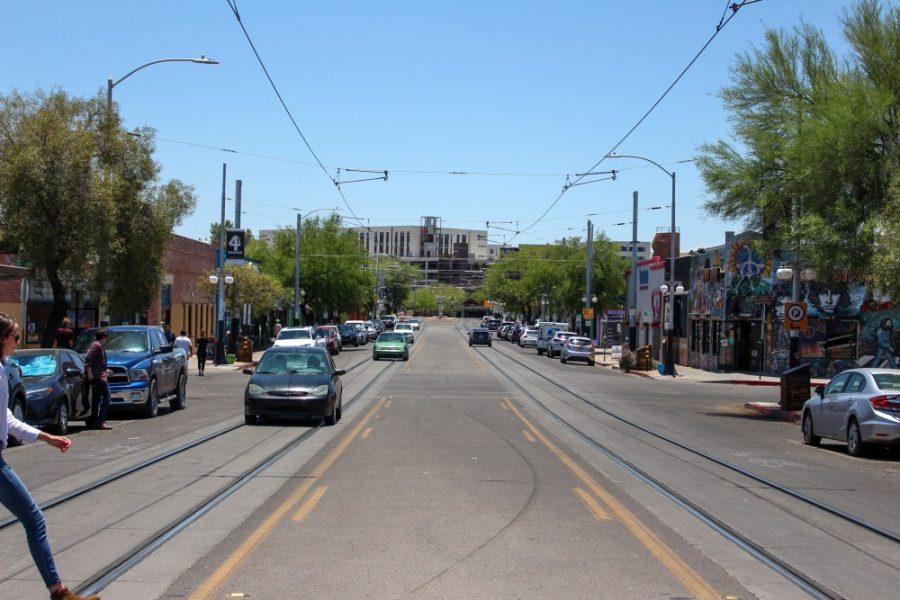The financial difficulties spurred by the coronavirus outbreak could hasten changes to University of Arizona student hotspot Fourth Avenue.
Small businesses, the driving force behind Historic Fourth Avenue, face challenges ranging from closures to construction projects like the new 13 story residential development from Opus Development.
According to a report from the UA’s Economic and Business Research Center, Tucson business retail sales were expected to drop by 5.2% in 2020.
Aid from Rio Nuevo, a gift card program, and the Small Business Administration, such as Paycheck Protection Program loans, were designed to soften the coronavirus financial blow to small businesses, which are not guarantees to completely solve all financial difficulties.
A journal article by Arthur C. Nelson, aUA professor of planning and real estate development and professor of geography development and environment, explained that small businesses closest to the Sun Link Streetcar (within a 0.125-mile distance) pay the highest rent premiums to be more accessible to consumers.
According to this study, new housing developments may increase costs for small businesses and make it difficult for existing businesses to meet this new expense. Some Fourth Avenue businesses may or may not attract and meet the needs of these new tenants.
According to Nelson, housing developments designed partially for the convenience of university students, such as the Union on Sixth or the Opus Development project, might have prompted these development changes on Fourth Avenue.
“It’s not a coincidence that it’s occurring at the universities. That’s the issue. As a market demand, universities simply have not produced student housing,” Nelson said. “The student housing they do have is old and might be removed because it is so old. So, who makes up the difference? The private market is coming in, which is actually efficient and providing student housing where the university simply cannot produce the student housing.”
According to U.S. news, 81% of UA students live off campus, which was not an unusual statistic according to the U.S. Department of Housing and Development.
Complicating the issue is the Government Property Lease Excise Tax, or GPLET, which encourages development by granting developers an 8 year property tax abatement.
Opus Development reportedly hastened GPLET meetings and did not sign a Community Benefits Agreement, although Mayor Regina Romero added language into Opus’s GPLET to ensure discussions between Historic Fourth Avenue Coalition could take place.
Shannon Riggs, owner of the sustainable local art shop Pop Cycle and chair of the Fourth Avenue Coalition, said there had not been much progress on a Community Benefits Agreement with Opus since the approval of the GPLET last September.
“We’ve been trying to pursue it for a while,” Riggs said. “Supposedly, her chief of staff was supposed to be negotiating with the lawyer for the developer on that. We had a meeting with them in January right after she took office. They told us they were working on it and there hasn’t been any movement on it since then.”
However, Riggs and the Fourth Avenue Coalition were able to reach a community benefits agreement with GEdR, the developers of a different housing complex called the Union on Sixth.
Other recent Opus Development projects across the country in college areas such as Richmond, Va. and Canal Winchester, Ohio followed a similar pattern of hastening city council meetings.
Councilman Steve Kozachik, the lone holdout vote on the Opus GPLET meeting, did not see much room for Opus’s accountability in the tax deal.
“They have not successfully negotiated a [community benefits agreement] with the group,” Kozachik said. “We can’t compel that either. The city can say the only leverage we had was to hold back on the GPLET until they signed the CBA.”
Councilman Kozachik acknowledged there was an effort to offer concessions.
“In fairness to Opus, they did make an offer. They sat down and made an offer, they put several things on the table. The neighbors wanted more and they said no, this is what we’re prepared to give,” Kozachik said.
Alyssa Higgins, a UA English, rhetoric and composition doctorate student, saw positivity in the very existence of groups such as the Fourth Avenue Coalition.
“But that’s my example I’ve seen of that something that I think is positive of, ‘Okay, this developments going to happen, but how can we secure community benefits from it?’” Higgins said. “And I think more of that needs to be modeled in neighborhoods that are not as well resourced as Fourth Avenue.”
Follow Ella McCarville on Twitter









